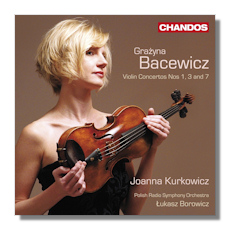
The Internet's Premier Classical Music Source
Related Links
- Bacewicz Reviews
- Latest Reviews
- More Reviews
-
By Composer
-
Collections
DVD & Blu-ray
Books
Concert Reviews
Articles/Interviews
Software
Audio
Search Amazon
Recommended Links
Site News
 CD Review
CD Review
Grażyna Bacewicz

Violin Concertos
- Concerto for Violin #1
- Concerto for Violin #3
- Concerto for Violin #7
- Overture
Joanna Kurkowicz, violin
Polish Radio Symphony Orchestra/Łukasz Borowicz
Chandos CHAN10533 DDD 63:47
There have been many composer-pianists, but perhaps not so many composer-violinists. (At least we don't hear about them so much.) Grażyna Bacewicz was one of them. Born in 1909, Bacewicz was trained as a composer by Nadia Boulanger (who else?), but also studied violin with Carl Flesch, whose other pupils included Ida Haendel and Henryk Szeryng. She spent most of her adult life in Poland, playing in the Polish Radio Symphony (the ensemble heard here), composing, and teaching at the State Conservatory of Music in her native city of Łodz. Most of her works for violin were premièred by Bacewicz herself. That is true for the two earlier concertos on this disc. By the time she composed the last of her seven violin concertos, she had retired as a performer. (A car accident in 1954 was a decisive factor.)
Chandos has programmed the three concertos in reverse chronological order, which, in the case of Bacewicz's development as a composer, means that the music gets friendlier as time goes on. Concerto #7 (1965) opens with a pained yelp, which is repeated later in the concerto. This concerto seems easily distracted, setting off in one direction only to change course a moment later. Even Chandos's annotator seems perplexed by it, commenting that the slow movement "poses more expressive questions than it answers." Although this concerto is written in a modern idiom, the language is not especially forbidding. Still, after many listens, I confess that I cannot grasp what Bacewicz is driving at in this concerto.
The Concerto #3, composed in 1948, is more approachable. Here, Bacewicz suggests her indebtedness to fellow Pole Karol Szymanowski, particularly in her use of folk idioms. These are seldom overt, but the concerto breathes fresh air, which is more than I can say of the preceding work. The Concerto #1 was composed in 1937 but not published until nearly the end of the century. Its thematic content is not striking. Nevertheless, Bacewicz manages her ideas gracefully, and with an appropriately imaginative ear for instrumental colors. Only 12 minutes in length, the concerto is not longer than justified by its materials. The brief Overture (1943) is the most attractive work here, in its cogency and in the strength of its themes. Perversely, it closes this CD!
This music clearly means a lot to violinist Kurkowicz, who has contributed a lengthy appreciation of it to the booklet notes. I have no reservations about her playing, nor about that of the Polish Radio Symphony under conductor Borowicz. Even so, I am not convinced, and if a Bacewicz renaissance is in the making – Kurkowicz touts him as the link between Szymanowski and Lutosławski – there has to be something stronger out there to represent her.
Copyright © 2009, Ray Tuttle




















